General
Launch of Mak Attendance Management System a Moment of Truth
Published
2 years agoon
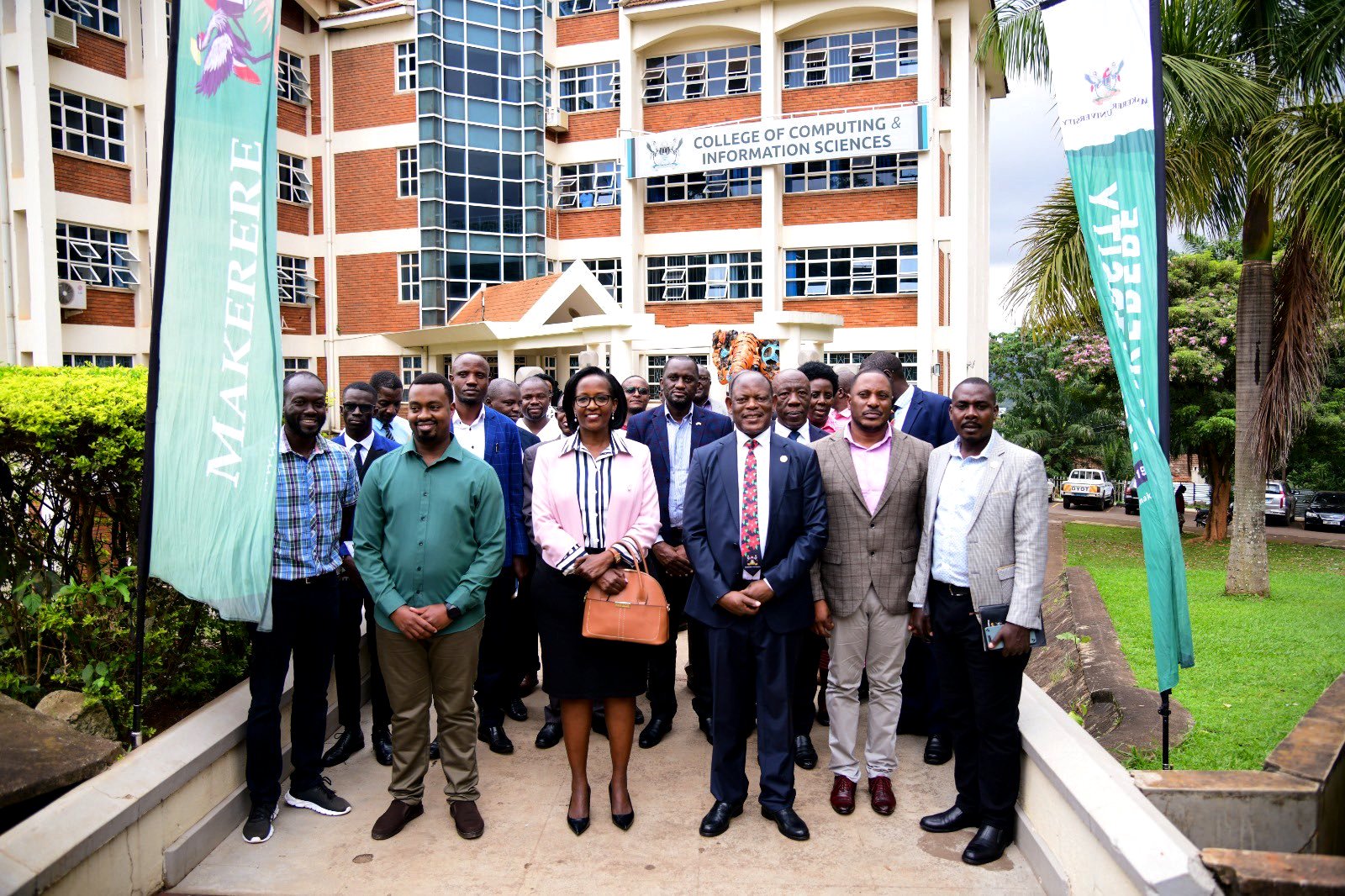
The launch of Staff and Student Attendance Management System presided over by the Chairperson of Council, Mrs. Lorna Magara on Friday 3rd May 2024 has been heralded as a moment of truth for the Council, Management, Staff, Students and Stakeholders of Makerere University. On Council’s part that includes improved performance management, accountability, and a transparent promotion process, while for Management it signifies a milestone in terms of achieving a professionally governed university and guaranteeing academic freedom. For staff and students it means improved monitoring and evaluation of teaching, learning and research activities, and for the Government and people of Uganda, clear accountability for the over UGX 200 billion annual wage bill.
In her remarks, Mrs. Magara took time off to allay fears that the system has been designed as a policing tool, stating that the University Council had carefully considered the multifaceted roles that staff, especially faculty, engage in both on and off-campus. The Council, she said, had therefore provided clear guidance to Management on allowances and authorisations that must be in place to enable faculty fulfil their functions.
She added that the decentralised collegiate system already caters for the direct supervision of faculty, while a similar devolved architecture applies to administrative and support staff. “So as we embrace this biometric system, I invite you to recognize the collective benefit it brings to Makerere University.”
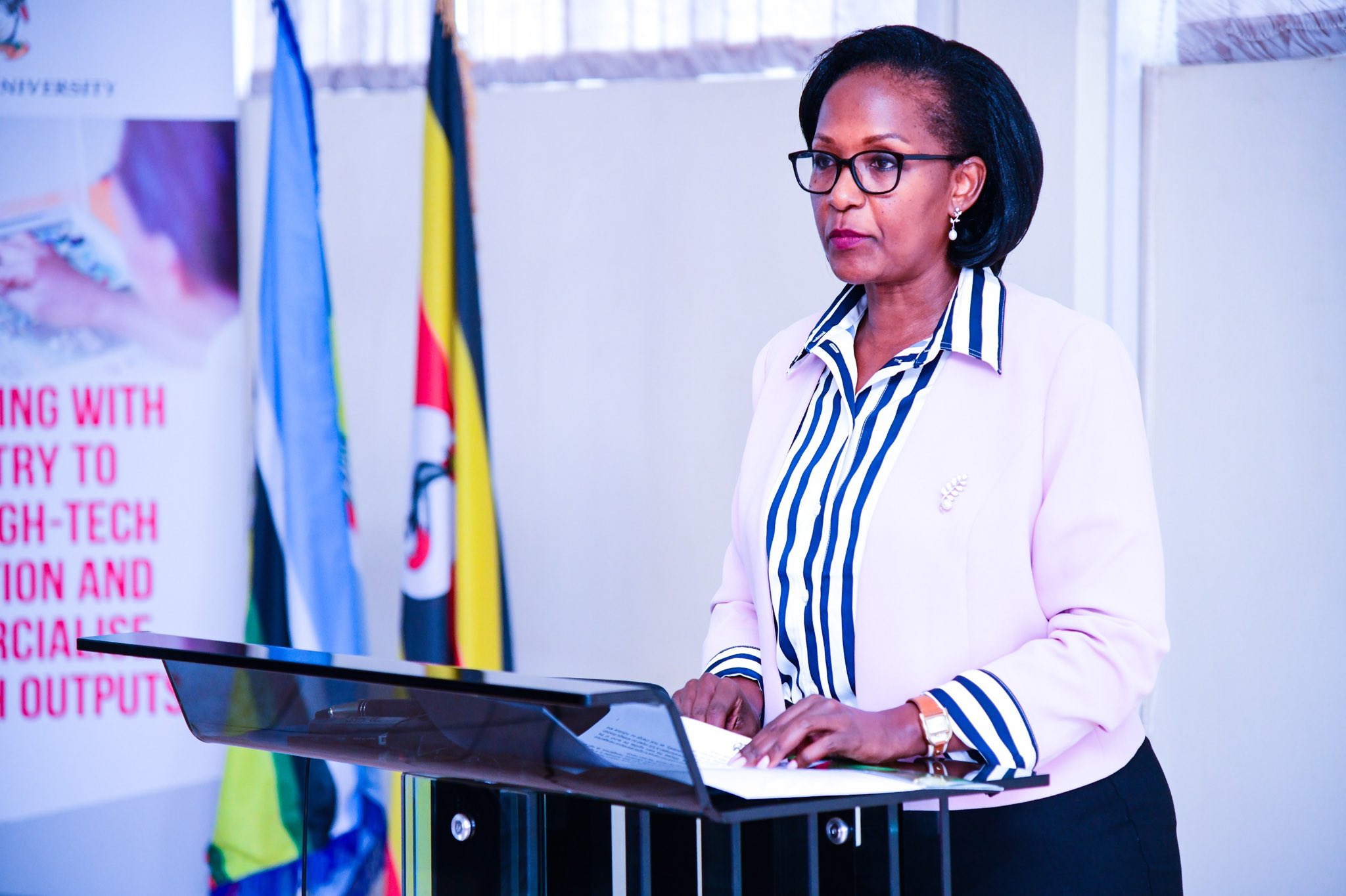
These benefits, noted the Chairperson of Council, include; improved service delivery for faculty, students and the administration, improved institutional ratings, as well as improved visibility and credibility for the system developers. She further noted that the attendance management system is only a fraction of the more comprehensive and holistic approach that the University Council is undertaking to strengthen performance management.
“In the current and future budgeting and other resource allocation processes, the Council prioritizes the acquisition of tools that enable the staff to perform and the students to learn effectively and in a conducive manner. For example, I am aware that the procurement processes for three buses for transporting students for field practicals has already been completed.
“The renovation of Lumumba Hall is nearing completion and Mary Stuart Hall will follow in line. There is increasing emphasis on research labs, teaching materials and related equipment. As part of our infrastructure development focus, the Council also addresses the need for faculty offices, graduate student centres, IT hardware and software for teaching and research” Mrs. Magara explained, concluding by requesting all staff and students to embrace the system.
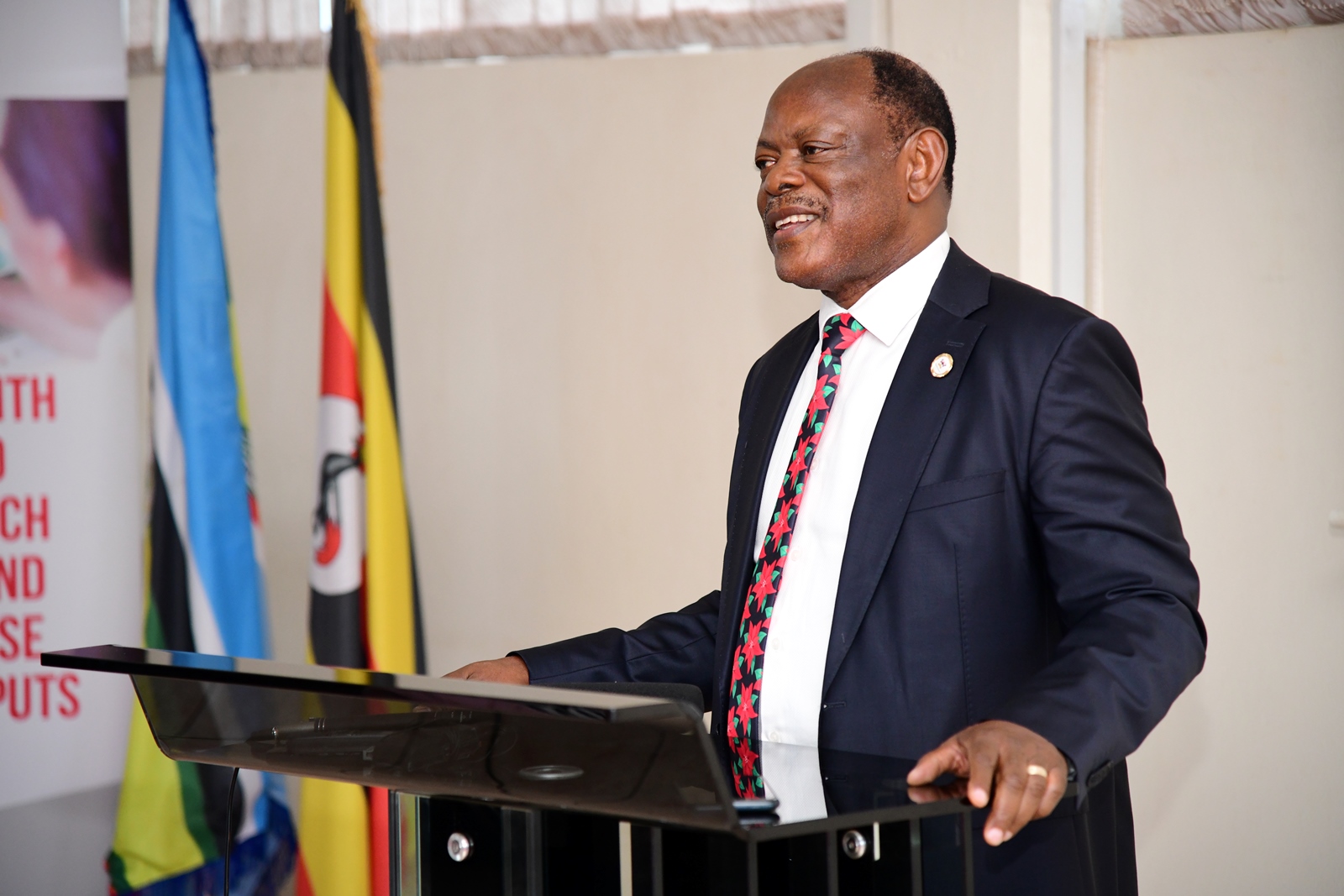
In line with embracing the system, the Vice Chancellor, Prof. Barnabas Nawangwe noted that the advent of the system should be received with happiness by all staff and students. “We must run our university professionally and the best way to do it is by going digital in every way possible.”
He added that Makerere has in addition to attendance management digitalised other activities such as human resources management, data repository, academic records and processes, research management, and prayed all business processes would have been completed by the end of 2024. The Vice Chancellor reiterated that the attendance management system’s implementation framework had been enriched by the input from staff representatives to cater for all teaching modes, including eLearning.
Prof. Nawangwe further emphasised that the system is in no way designed to curtail academic freedom, but rather promote it through proper accountability for time spent at the workplace. “The Council as our employer ought to know whether the person that is employed is doing their job.”
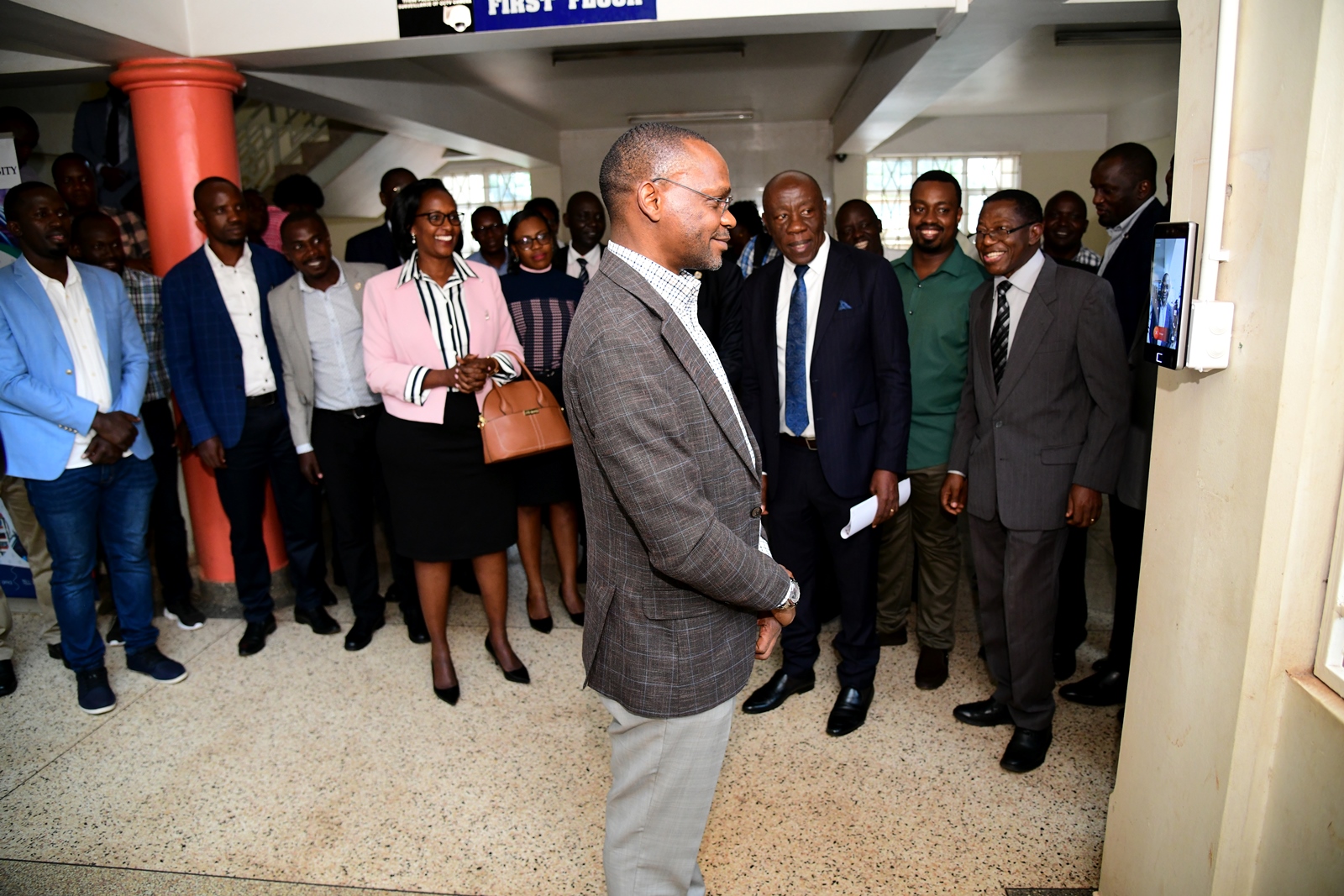
He therefore thanked the Director, Directorate for ICT Support (DICTS), Mr. Samuel Mugabi and his staff for alleviating the need for Makerere to rely on expensive, externally-sourced systems. “Since we realized the resources that we have in-house, the digitalisation of the university has just gone up.”
The Director Human Resources (HR), Mr. Tayari Deus Mujuni on his part thanked the University Council for ensuring that development of the system was funded, Management for ensuring that the system is implemented, and the Director DICTS for ensuring that the system is developed and delivered on time.
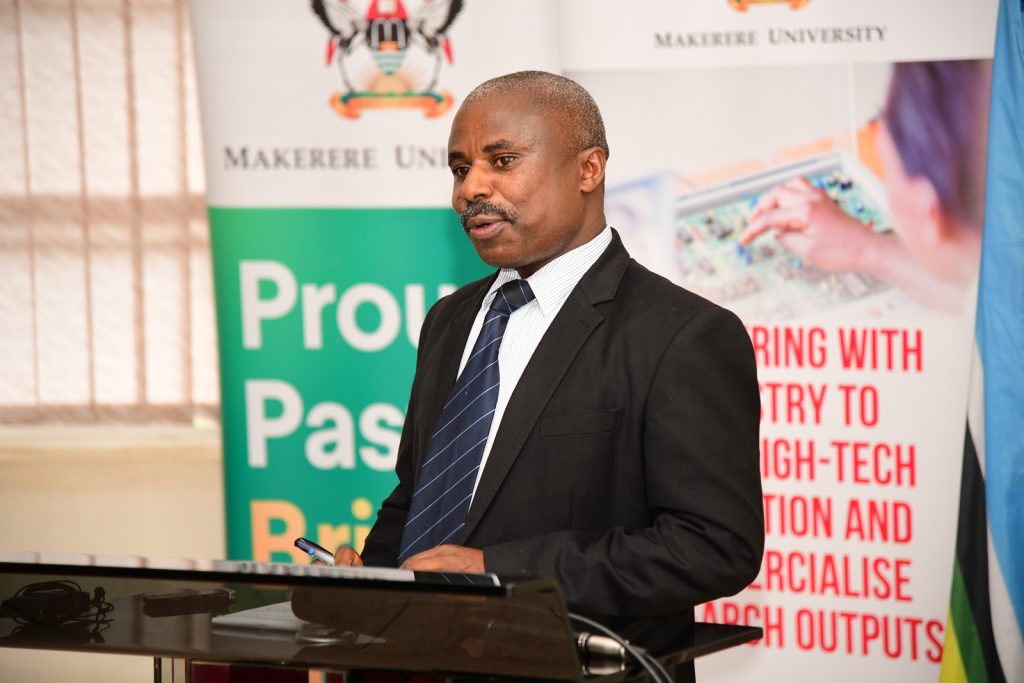
One of the deliverables of the system will be human resource analytics. Mr. Mujuni commended this output as a quick way to measure whether staff are delivering according to their mandate. “If we continually generate these analytics, it becomes easy for us to know the teaching load, to follow up on requests for staff appointments in terms of how many staff you have and how many staff you need.”
The Director HR further noted that the system will come in handy in providing accountability to Government in terms of staff and students being taught. “The audit query will not arise again because we will have the evidence of all staff in attendance and account the funds that Government has contributed in terms of wage.”
Presenting the system’s architecture, Mr. Samuel Mugabi said it consists of biometric devices to enable staff clock in/out using their thumb-print or facial-image. For those who may for any reason or impairment not be able to reach the height of the biometric devices, an AI-enabled voice-recognition capability is being explored for future deployment.
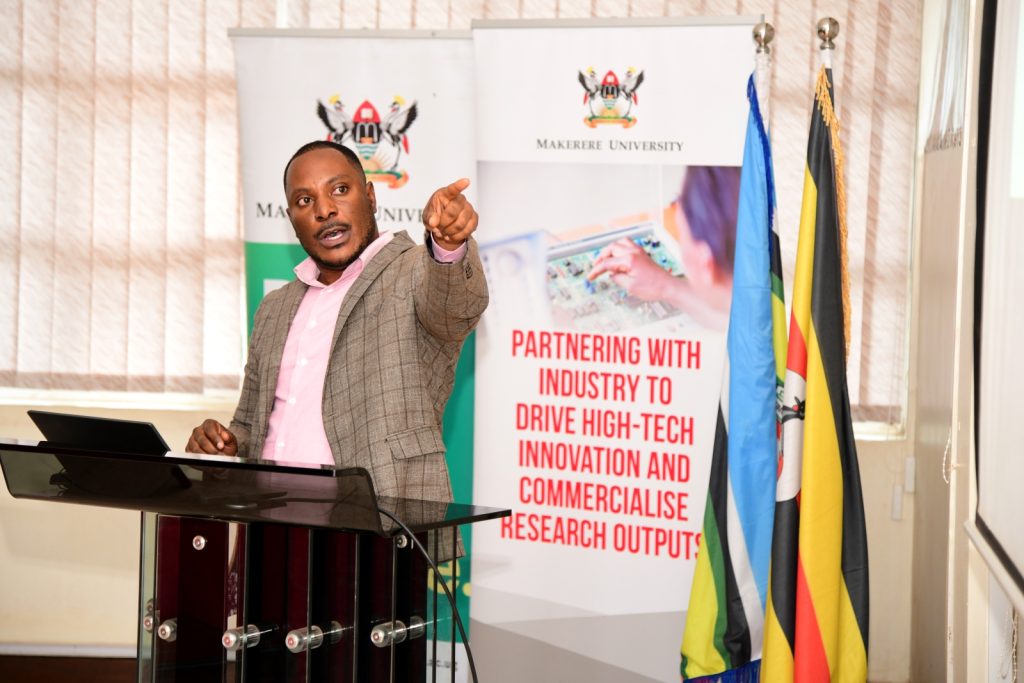
He added that for teaching staff, a student attendance management system has been developed and integrated with both Academic Management Information System (ACMIS) and the electronic-Human Resource Management System (e-HRMS). This will enable students to register class attendance by selecting their time-tabled course, lecturer’s name, and submit their attendance register. The system will register GPS coordinates of teaching venues and any registration done using a mobile-based app on a device that is not within range will not be recorded.
Mr. Mugabi nevertheless appreciated that cultural transformation is very important for the system to succeed. “We cannot transform or automate a process until we appreciate why it is important,” adding that the way system users are brought on board is very important for their adoption and use.
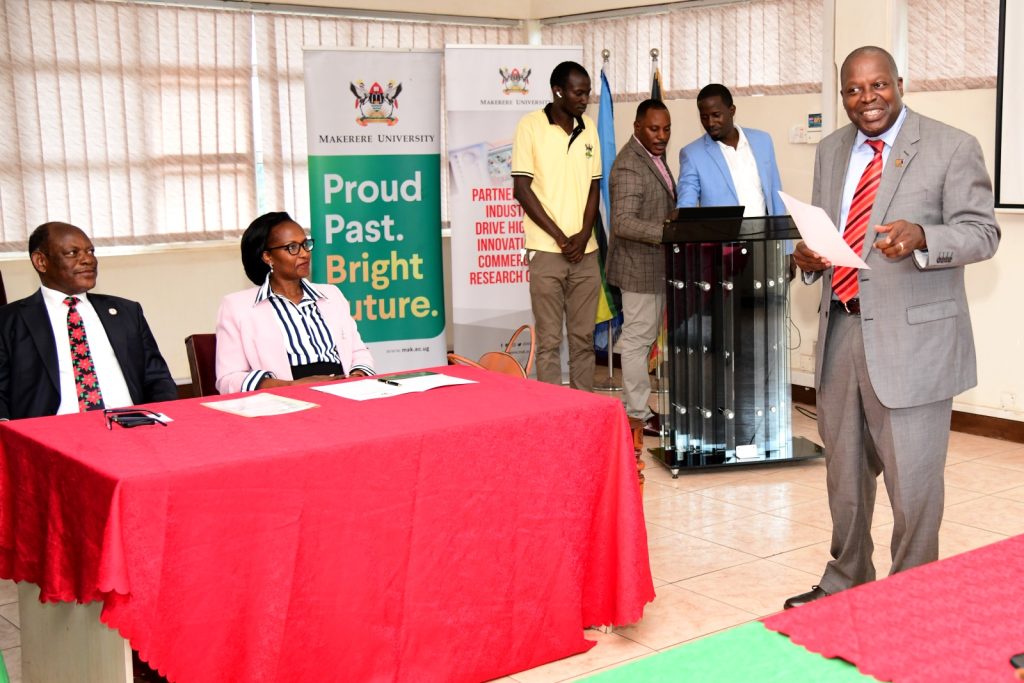
The launch event was proudly by the College of Computing and Information Sciences (CoCIS), which prides itself in conducting high-quality research and educating the next cadre of leaders, entrepreneurs, teachers, skilled labor force, digital innovators, wealth creators, and young scientists. Addressing his audience the Principal Prof. Tonny Oyana noted that CoCIS, by virtue of its mandate, will remain a very important college, especially in the next 20 – 30 years as the digital revolution unfolds. “We are at the forefront of deliberations anywhere in this university.”
He recognised the presence of the Chairperson of Council, Members of Council, Vice Chancellor, Deputy Vice Chancellors, Members of Management, College Principals, Staff and Students who graced the event.
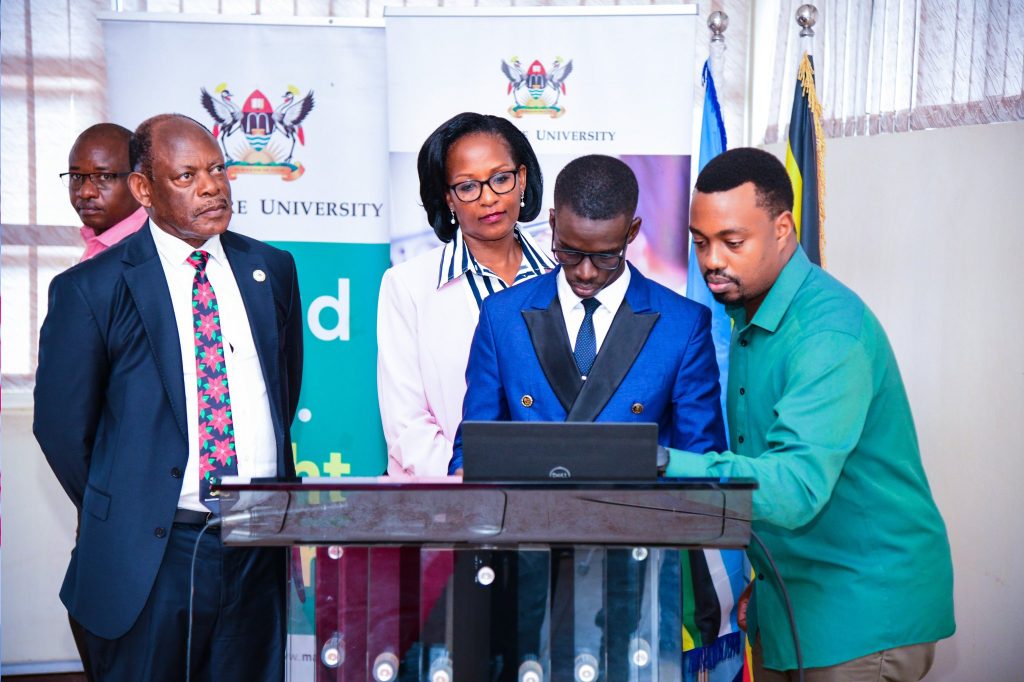
H.E. Vincent Lubega Nsamba was on 18th March 2024 sworn in as the 90th Guild President of Makerere University and effectively, leader of the Guild Cabinet and student body. Represented by his Minister for Information, Research and Computer Technology, Hon. Emojong Kisaija Harman at the launch, the Guild President welcomed the system, given the necessity of adopting of ICT in the digital era.
“We as the Students Guild are optimistic that this initiative and the system being launched today will improve service delivery to students with regard to teaching” appreciated Hon. Emojong. He reassured the University Leadership of the Students Guild’s readiness to participate in the system rollout and willingness to raise awareness among the student body of its benefits.
You may like
-


Makerere University School of Public Health Graduates First Cohort of Cost-Effectiveness Analysis Short Course
-
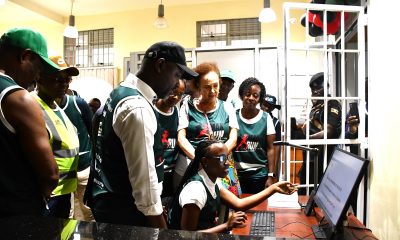

Students empowered to thrive through the Semester
-


Climate variability found to shape malaria trends in Yumbe District
-


Mak hosts First African Symposium on Natural Capital Accounting and Climate-Sensitive Macroeconomic Modelling
-


Uganda Martyrs Namugongo Students Turn Organic Waste into Soap in an Innovative School Project on Sustainable Waste Management
-


Olivia Nakisita and the Quiet Urgency of Adolescent Refugee Health
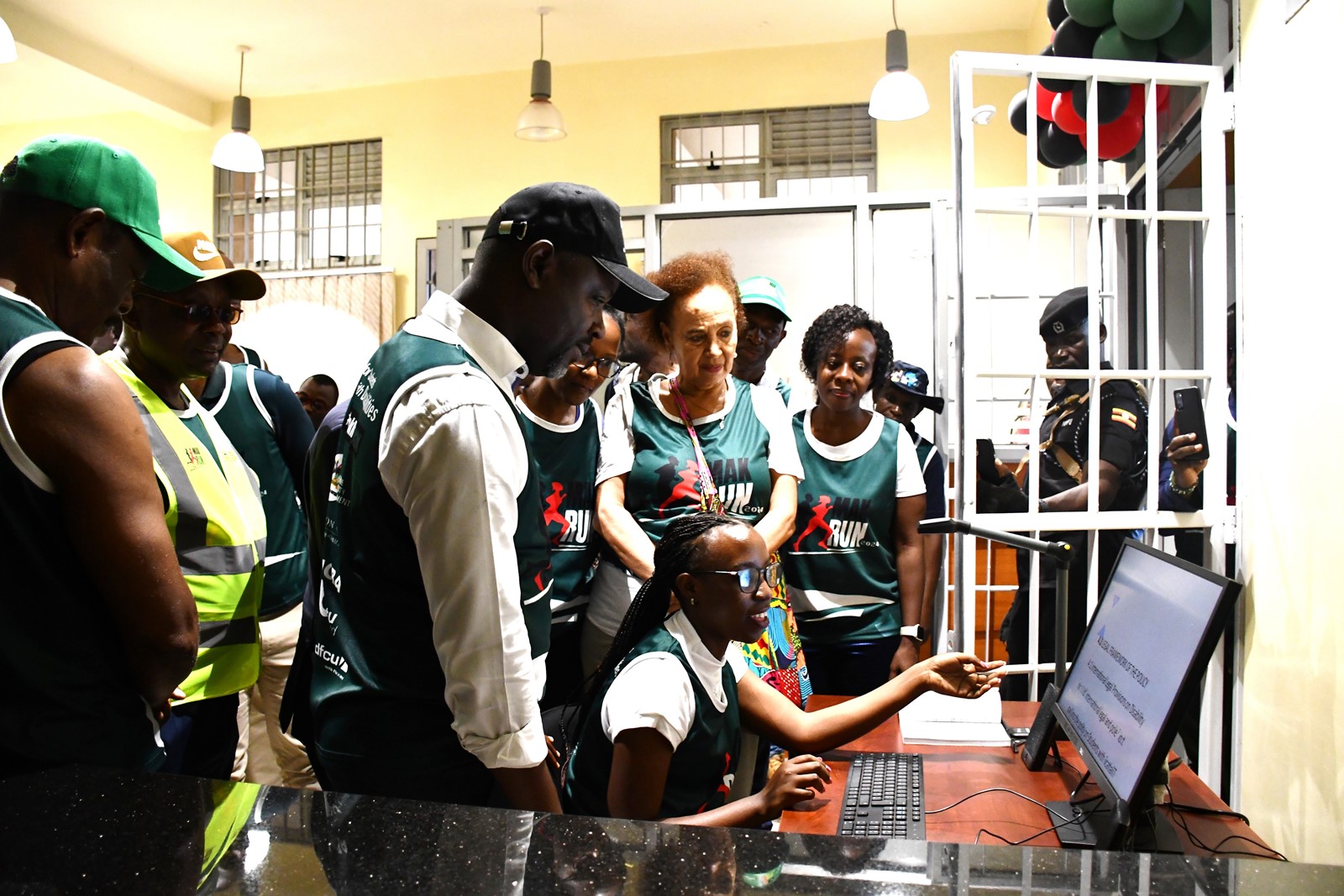
Students with disabilities at Makerere University have been requested to stop seeking for special attention and instead look for solutions and opportunities for personal growth.
This was during a mental wellness, inclusion and safeguarding session organized by the Dean of Students office and the Mastercard Foundation Scholars Program at Makerere University.
Addressing students on mental health and disability inclusion, Mr. Marvin Ggaliwango, a lecturer at the College of Computing and Information Sciences (CoCIS), noted that if the students stop complaining, they will become empowered to take charge of their own development, build resilience and engage confidently in both academic and social environments.
“Turn your lived experiences into tools for innovation. Stop complaining and start creating solutions for yourselves. You are the one living this life, and that gives you the authority to be an expert. When you develop a solution, it doesn’t just benefit you, it helps others too, by removing barriers,” Mr. Marvin Ggaliwango, said.
He encouraged students to see themselves not as victims of circumstance, but as active participants and co-creators of the inclusive environment they wish to experience.
“Learn how to communicate effectively and humbly. If you have a problem, express yourself clearly. Do not isolate yourself or feel resentful. You are not defined by disability, you may face disadvantages, but you still have ability,” he encouraged.
Throughout the session, students listened attentively as he emphasized the importance of self-awareness and personal responsibility, urging them to understand their strengths, acknowledge their limitations and take deliberate steps toward personal growth while contributing positively to the University community.
“We must enhance and ensure that our mental health is number one. Always choose yourself first. Choose what makes you happy and protect your peace. If you are at peace with yourself, your academics will improve. There is a strong link between mental wellness and academic success,” Mr. Ggaliwango, noted.
In his speech, Mr. Musa Mwambu, the Disability Inclusion Advisor at Light for the World Uganda, called upon the students with disabilities to enhance and ensure that their mental health is prioritized.
“As students living with disabilities, sometimes you over expect, because you have a disability you should be given, listened to and when people do not listen to you, you attribute it to your disability, get it from me, even those without disabilities are not listened too. Things are not happening to you because of your disability it is because of the world we live in. Everything that happens to you can happen to others,” Mr Mwambu, noted.
“Have fun with your life. Make yourself happy and be smart. Present yourself in public confidently wherever you go. The way you carry yourself can improve your mental health and how others perceive you,” Mr. Mwambu said.
He reminded the students that gaining admission to Makerere is itself a milestone.
“There are many people without disabilities who have never stepped at Makerere University. Find something that empowers you and hold on to it. You may have a physical impairment, but if you are brilliant in class, you can lead discussions and inspire others,” he added.

During the session, Dr. Rodney Rugyema, the Acting Principal Warden, welcomed the students back from the long holiday. He assured them that the University is committed to their safety and well-being while on campus.
Dr. Rugyema emphasized that the University has systems in place to protect students, both physically and psychologically and encouraged them to report any concerns promptly.
“When you are at the University, you are not on your own, we are always here for you. For us to engage you on mental wellness and inclusion, we want you to be in the right state of mind, whole and complete,” Dr Rugyema, said.
He added: “We are here to empower you and we are calling upon you not be a risk for yourself and always be able to detect risks that are likely to affect your mental health and works towards avoiding them and reporting them to ensure that the University manages them before they escalate into real harm whose impact is more serious than you can think,”
During the session, Ms. Diane Nabikolo Osiru highlighted the University’s broader commitment to safeguarding.
Safeguarding at Makerere University refers to measures put in place to promote safety and wellness of all students, staffs and other stakeholders.
“At Makerere University, safety is not a luxury for few. but it is a right for every student. As the semesters begins, we are urging you to learn how to identify signs of harm or abuses and report them to the appropriate safeguarding contact points,” Ms Nabikolo, said.
For support in case of any harm or abuse, International and Refugee Students, can access support through the Advancement and International Office, while Students with Disabilities, can utilize the Disability Support Center. Those with personal and emotional challenges, can visit the Counselling and Guidance Centre.
In his speech, Dr Joab Agaba, a Lecturer in the College of Computing and Information Sciences, guided students how to report risks and incidences to the MakSafeSpace, the e-reporting platform complimenting the other University traditional reporting channels.
Mr. Henry Nsubuga, the Manager of the Counselling and Guidance Center, shared practical strategies for coping with stress effectively including time management, setting realistic goals, seeking support from peers or counsellors.
Students speak out
Shanitah Nahamya, 2nd year student of the Bachelor of Adult and Community Education
“I have learned how to respectfully and appropriately engage with students with disabilities. In the past, I often felt pity when I encountered them, but now I understand that what they need is not pity, it is respect, support, and equal opportunity.”
Guo Dorothy Geri, 1st year student of the Bachelor of Commerce
“I have learnt how to use inclusive language. Before offering help to a student with a disability, I will first ask them, because not all the time do they need our help. You might think someone wants to be helped to cross the road, yet they are waiting for someone.”
Valentines Doris Aduka, 1st Year student of the Bachelor of Biomedical Science
“I have been calling students with disabilities special names, thinking it was kind. But I have learned that they do not want to be treated differently or labeled in a special way. What they value most is being treated like everyone else, with respect, dignity, and fairness.”
General
Strengthening Global Partnerships to Advance Research, Innovation, and Graduate Training: Makerere University Hosts Delegation from the University of Warwick
Published
3 days agoon
February 19, 2026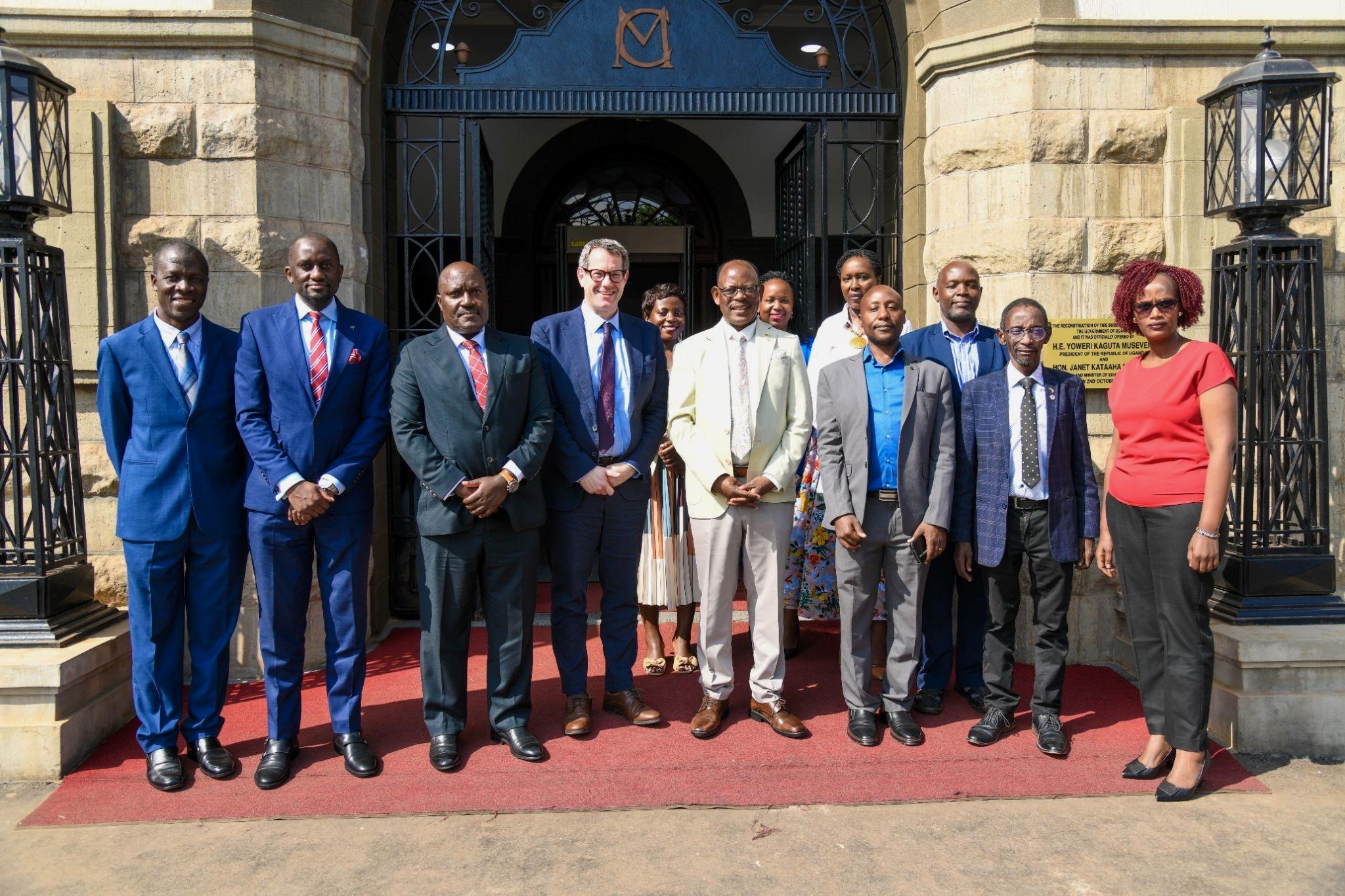
Makerere University continues to deepen its global engagement agenda through strategic partnerships that enhance research, innovation, and graduate training. On Friday, 13th February, 2025, during a recent engagement with a delegation from the University of Warwick (UK), university leaders, researchers, and administrators explored potential collaborations to address pressing development challenges and strengthen institutional capacity.
Expanding Collaboration in Research and Innovation
Welcoming the delegation, Prof. Fred Masagazi-Masaazi, Chairperson of the Makerere University Research and Innovations Fund (Mak-RIF) Grants Management Committee, emphasized the growing dialogue between Makerere University and the University of Warwick. He noted that ongoing discussions are focused on resource mobilization to support research and innovation, as well as building sustainable academic exchanges for both staff and students.
Dr. Roy Mayega, Mak-RIF Coordinator, together with Mrs. Phoebe Lutaaya Kamya, Deputy Coordinator, and members of the Mak-RIF team, highlighted the Fund’s role in catalyzing collaborative research and strengthening partnerships that translate research into societal impact.
Mr. Simon Kizito, Deputy University Secretary, outlined key areas identified for collaboration, including joint research and innovation initiatives, benchmarking visits across disciplines such as law, science, and ICT, and student exchanges designed to strengthen applied research skills. He also pointed to opportunities for training Makerere staff in specialized areas such as tropical diseases and innovation ecosystems, drawing lessons from Warwick’s strong linkages with industry partners located within its campus.
Makerere’s Strategic Priorities and Global Role
In his remarks, the Vice Chancellor underscored the longstanding relationship between Makerere University and the University of Warwick, dating back to the early 1980s, initially through staff training and more recently through collaborative research.
He highlighted Makerere’s historic contribution to leadership development across Africa and beyond, and the University’s continued growth following faculty rebuilding efforts in the 1980s, which have strengthened its research capacity. Today, Makerere has over 1,300 academic staff, more than 1,000 of whom hold PhDs, positioning the institution to play a leading role in knowledge production.
The Vice Chancellor also outlined major thematic areas where partnerships are critical:
- Climate change and food security: Researchers at the College of Agricultural and Environmental Sciences (CAES) are developing drought-resistant and high-yield seed varieties to address changing weather patterns and food insecurity.
- Public health and infectious diseases: Uganda faces frequent outbreaks of diseases such as Ebola and Marburg, and Makerere has built strong capacity in outbreak response and tropical medicine. The University’s medical school and the Infectious Diseases Institute (IDI) continue to play a pivotal role in research and treatment.
- Peace and conflict studies: Through initiatives such as the Rotary Peace Centre, Makerere contributes to training global leaders in conflict resolution.
- Climate-sensitive macroeconomic modelling: Makerere recently hosted a conference in collaboration with the Ministry of Finance, Planning and Economic Development to advocate for climate-responsive macroeconomic modelling and to plan for the establishment of a Centre of Excellence in this field.
- Innovation and technology: The University’s innovation ecosystem has produced notable outputs, including Africa’s first electric vehicle and ongoing work to expand incubation facilities to enable students to graduate with viable enterprises.
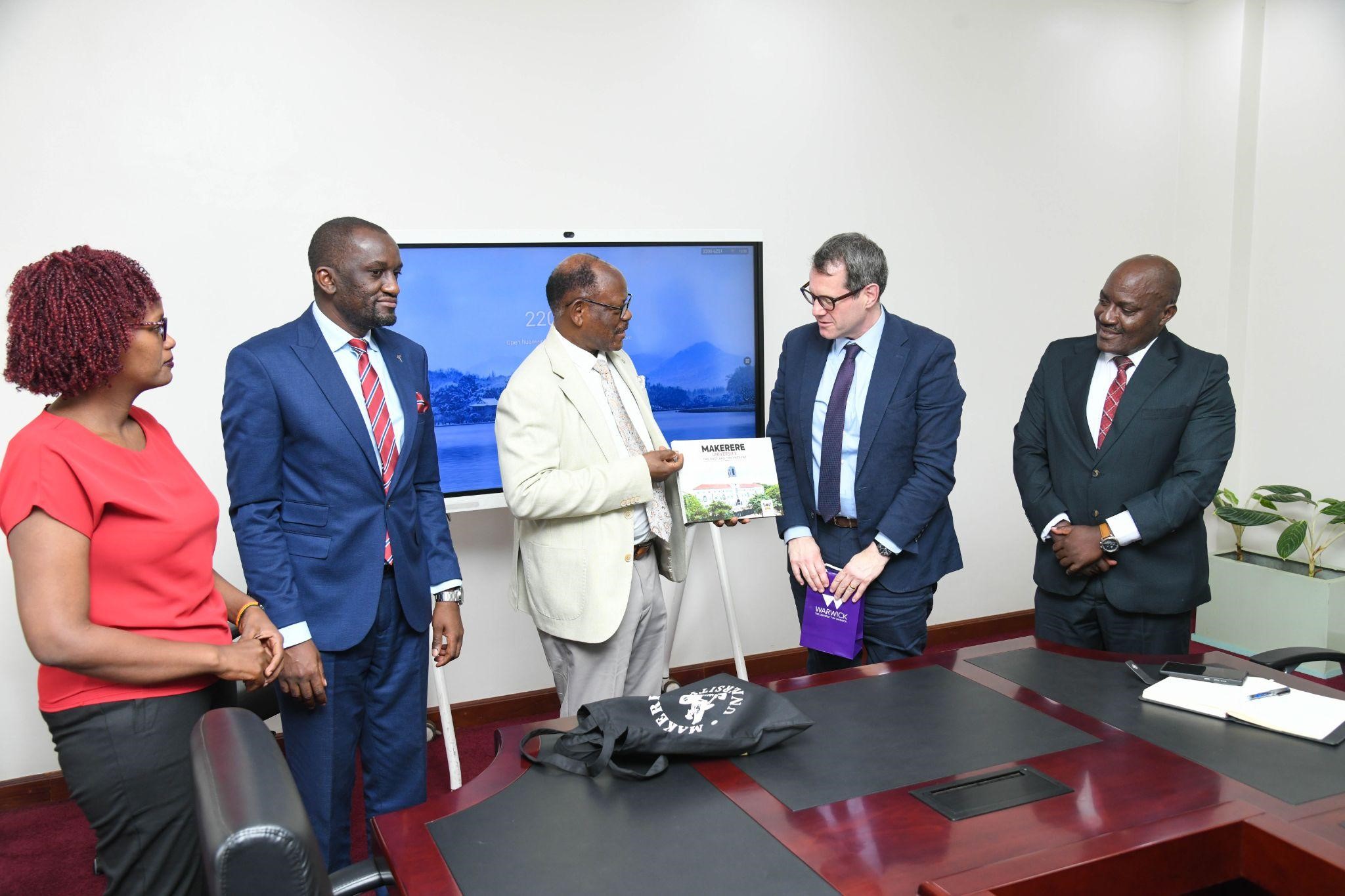
The Vice Chancellor emphasized that addressing youth unemployment remains a central priority, noting that innovation, entrepreneurship, and graduate training are essential to building stable societies.
He further stressed the importance of expanding graduate education. Africa currently produces a small proportion of global research output, and increasing PhD and Master’s training supported by international partnerships remains critical to accelerating knowledge production and development outcomes.
Internationalization and Shared Learning
Speaking on behalf of the University of Warwick, Professor Daniel Branch, Deputy Vice Chancellor, reflected on Warwick’s own institutional journey, noting that its growth has been driven by a strong focus on internationalization, innovation, and research. He expressed Warwick’s commitment to building productive partnerships with African universities, including Makerere, to advance joint research, training, and innovation.
Professor Branch also highlighted the importance of university-industry linkages, citing examples such as collaborations with major manufacturing firms that provide practical training opportunities and inform curriculum development.
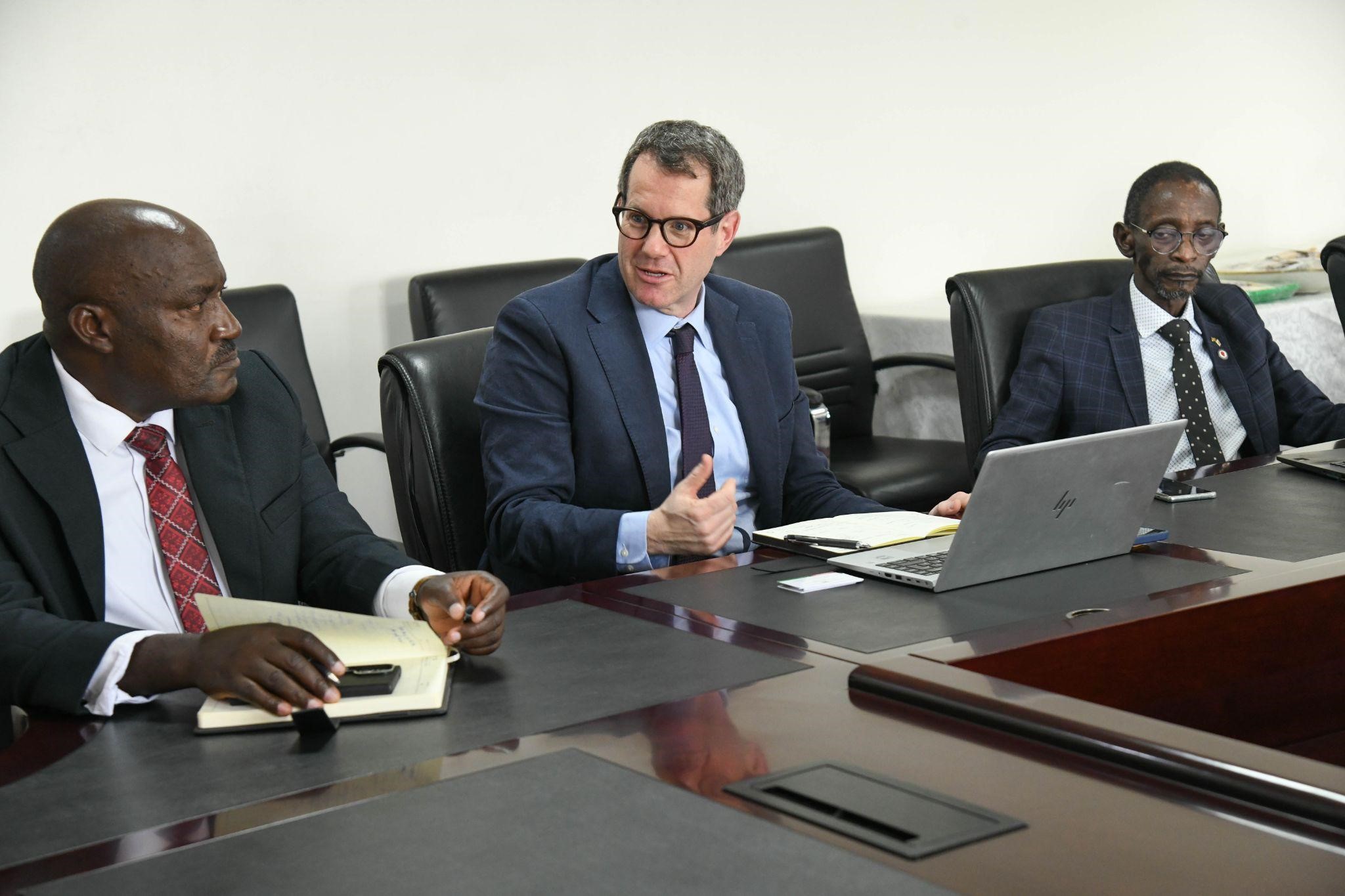
Showcasing Research and Innovation at CEDAT
A second session of the engagement was held at the College of Engineering, Design, Art and Technology (CEDAT), where academic leaders and researchers presented ongoing work across multiple disciplines.
Presentations included:
- Development of a solar water pump through reverse engineering (Dr. Edmund Tumusiime)
- Crane Cloud, a locally developed cloud-computing platform (team from the College of Computing and Information Sciences)
- Profiling gaseous emissions associated with burnt bricks (Dr. Nathan)
- Integration of centralized grid and decentralized renewable off-grid systems: a techno-economic analysis (Dr. Abubaker Waswa)
- Innovation and digitalization pathways for affordable housing in Sub-Saharan Africa (Prof. Stephen Mukiibi)
The session was attended by CEDAT leadership, including the Principal, Prof. Moses Musinguzi, as well as deans and heads of department from engineering, built environment, and industrial and fine arts. The day’s activities were concluded with a tour of Makerere University’s Innovation Hub.
The engagement reaffirmed Makerere University’s commitment to building strong, mutually beneficial partnerships that accelerate research, strengthen graduate training, and drive innovation. As global challenges such as climate change, public health threats, and youth unemployment intensify, collaboration among universities remains essential to developing scalable, evidence-based solutions.
Through partnerships such as the one Makerere University and the University of Warwick hope to activate through a Memorandum of Understanding in the near future, Makerere continues to position itself as a leading research-intensive university dedicated to transforming society through knowledge, innovation, and global cooperation.
Caroline Kainomugisha is the Communications Officer, Advancement Office, Makerere University.
General
Mastercard Foundation Scholars embrace and honour their rich cultural diversity
Published
4 days agoon
February 18, 2026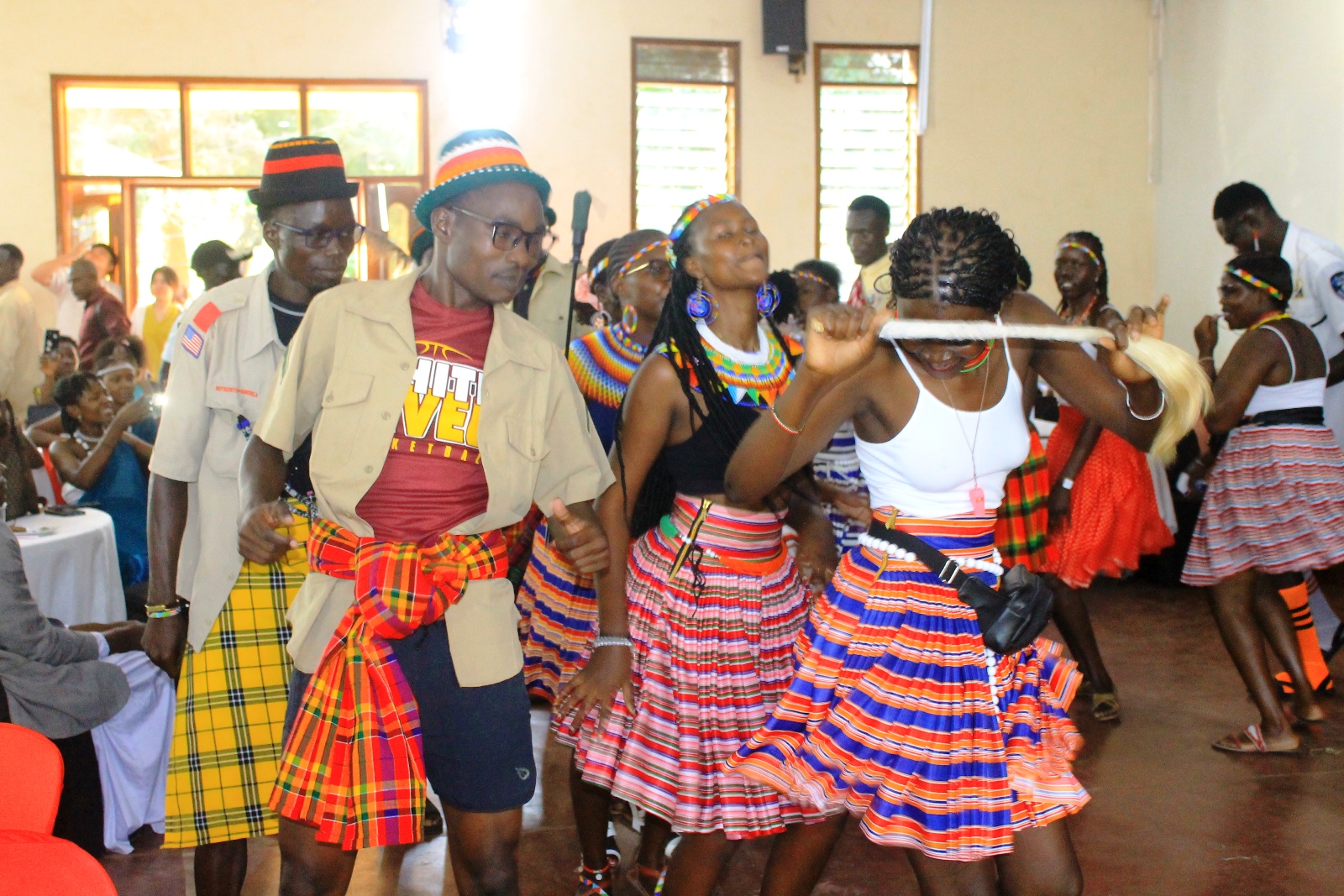
On the evening of Friday, 13th February 2026, the Scholars of Mastercard Foundation embraced the new semester with enthusiasm and celebration, showcasing their rich cultural diversity at the annual cultural dinner. This event not only fostered a sense of community but also highlighted the importance of cultural exchange and understanding among the scholars. The purpose of the cultural dinner is to foster unity in diversity within the Scholars community and to enable young people to appreciate and respect each other’s cultural differences.
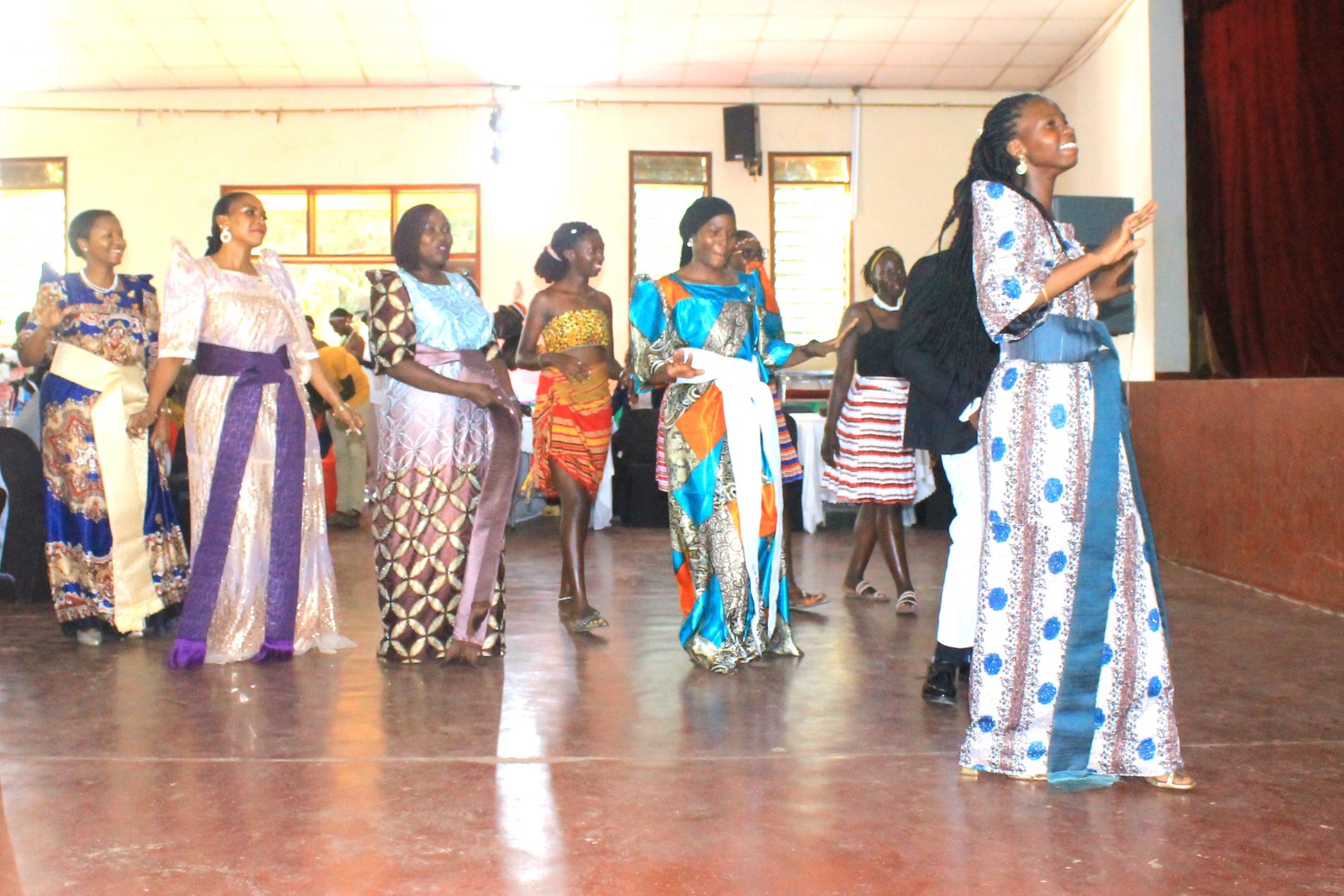
The Mastercard Foundation Scholars community at Makerere University is a vibrant tapestry of countries, cultures, and backgrounds. In recognition of this richness, the Program team has proposed organising an annual cultural dinner to kick off each new semester. This event aims to achieve several important objectives:
- Promote mutual understanding and cross-cultural appreciation among Scholars.
- Celebrate and highlight the unique cultural identities within our community.
- Encourage confidence and creativity through a dynamic talent showcase.
- Foster a sense of unity and excitement as we embark on the new academic semester together.
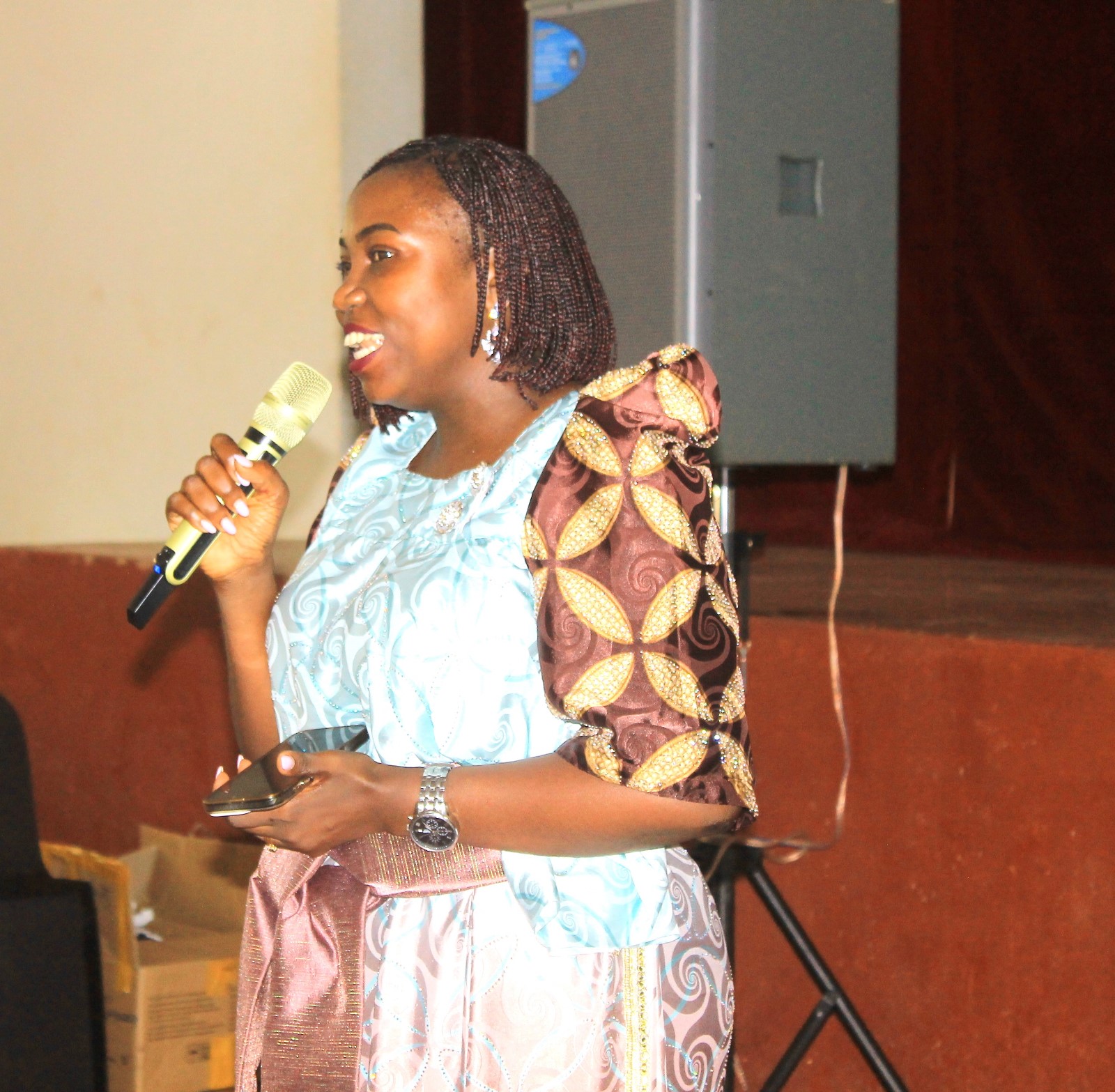
During the event, the Scholars proudly showcased their diverse cultures through a vibrant display of traditional attire, engaging dances, delectable dishes, and meaningful expressions in their native languages. The event showcased a rich tapestry of cultures, including the Baganda from Central Uganda; the Banyankore, Bakiga, Batooro, and Banyoro from Western Uganda; the Acholi from the North; the Karamojong from the Northeast; and the Basoga and Bagisu from the Eastern region, among many other indigenous tribes in Uganda. Additionally, attendees enjoyed cultural performances from South Sudan, Rwanda, and the Democratic Republic of Congo, celebrating the unique heritage of each community.
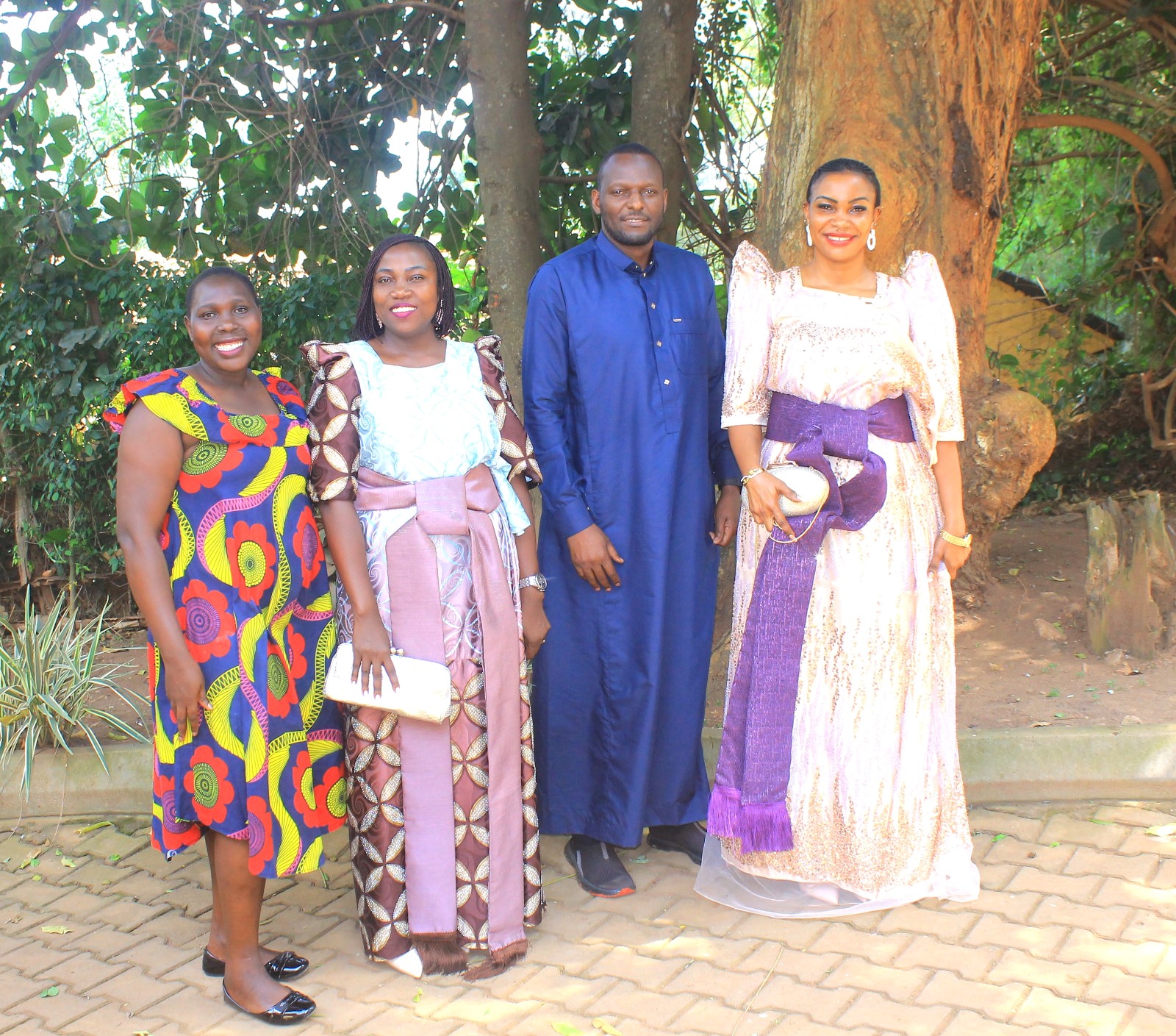
The event also featured a vibrant showcase of cultural attire, accompanied by traditional songs and dances. Attendees enjoyed cultural dress modelling, engaging performances, art displays, and interactive quizzes, culminating in exciting prizes awarded to outstanding performers. This diverse array of activities contributed to a rich celebration of creativity and cultural exchange.
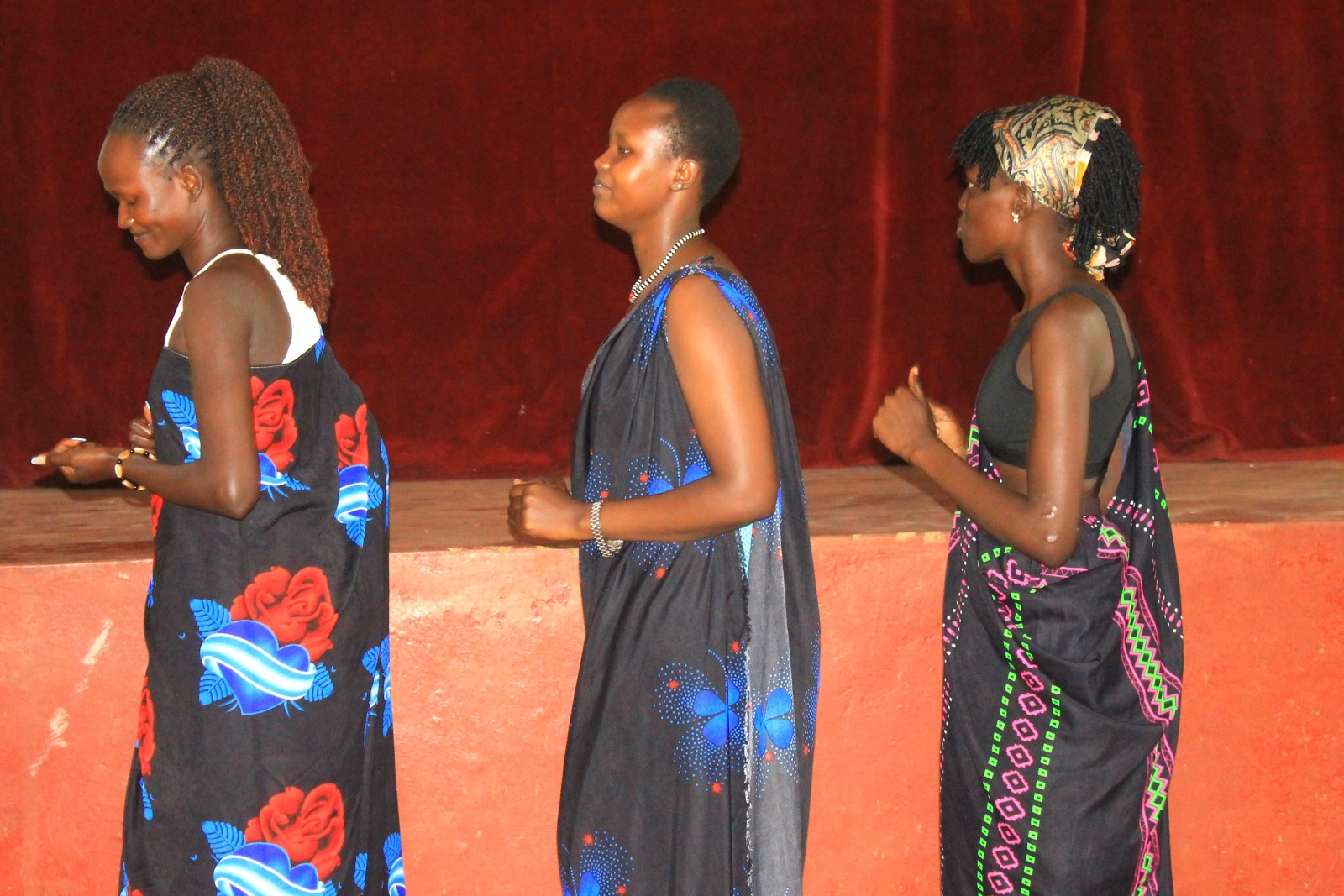
The Mastercard Foundation Scholars Program at Makerere University is committed to fostering holistic development, community building, and leadership among Scholars. At the start of each semester, the Program Team hosts a cultural dinner to reconnect the Scholars community, share key Program updates, and create an inclusive space to strengthen belonging and engagement. The cultural dinner is a critical platform for raising awareness of the need to appreciate and respect cultural diversity.
Bernard Buteera is the Principal Communications Officer for the Mastercard Foundation Scholars Program at Makerere University.
More Photos from the Dinner
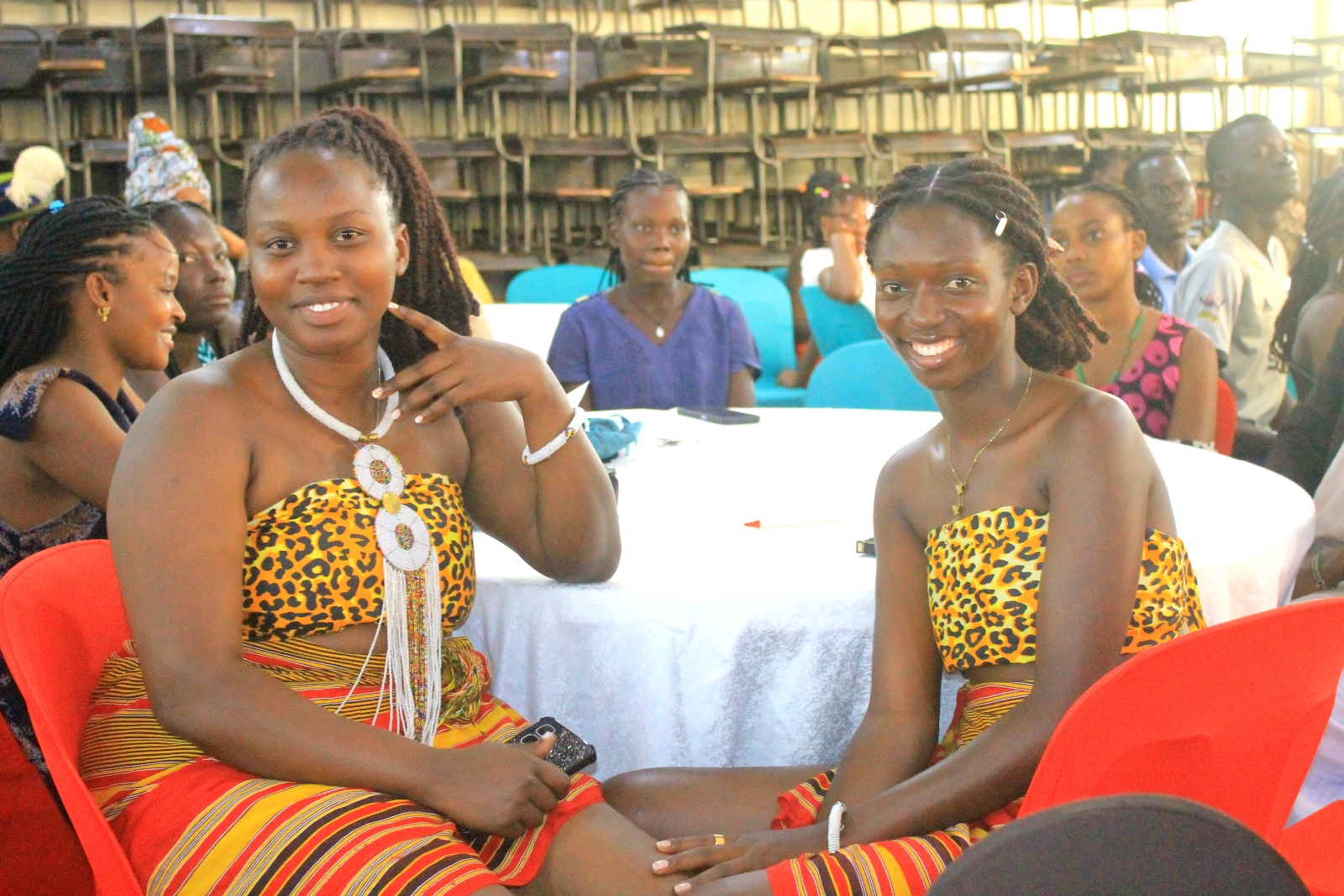
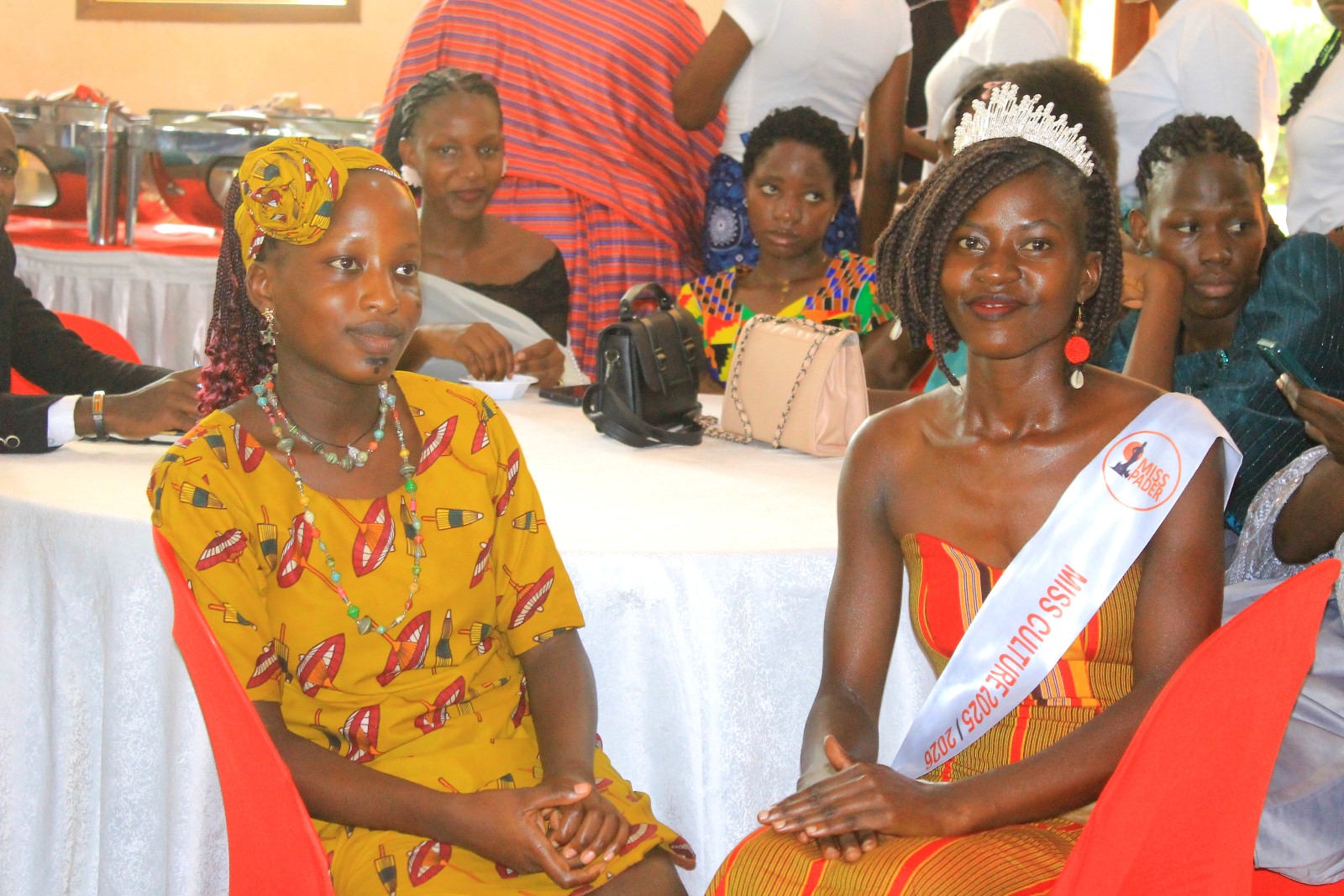
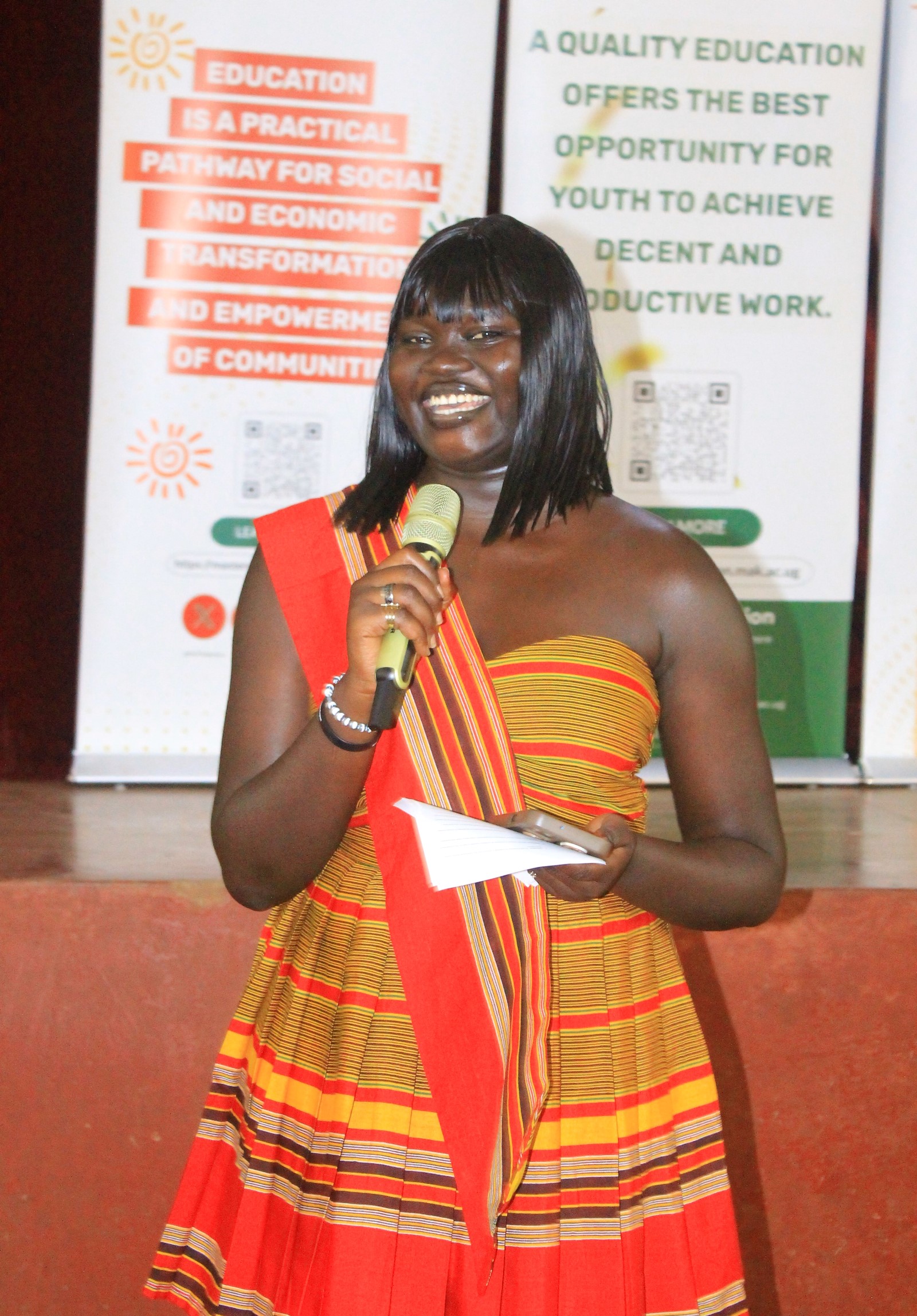
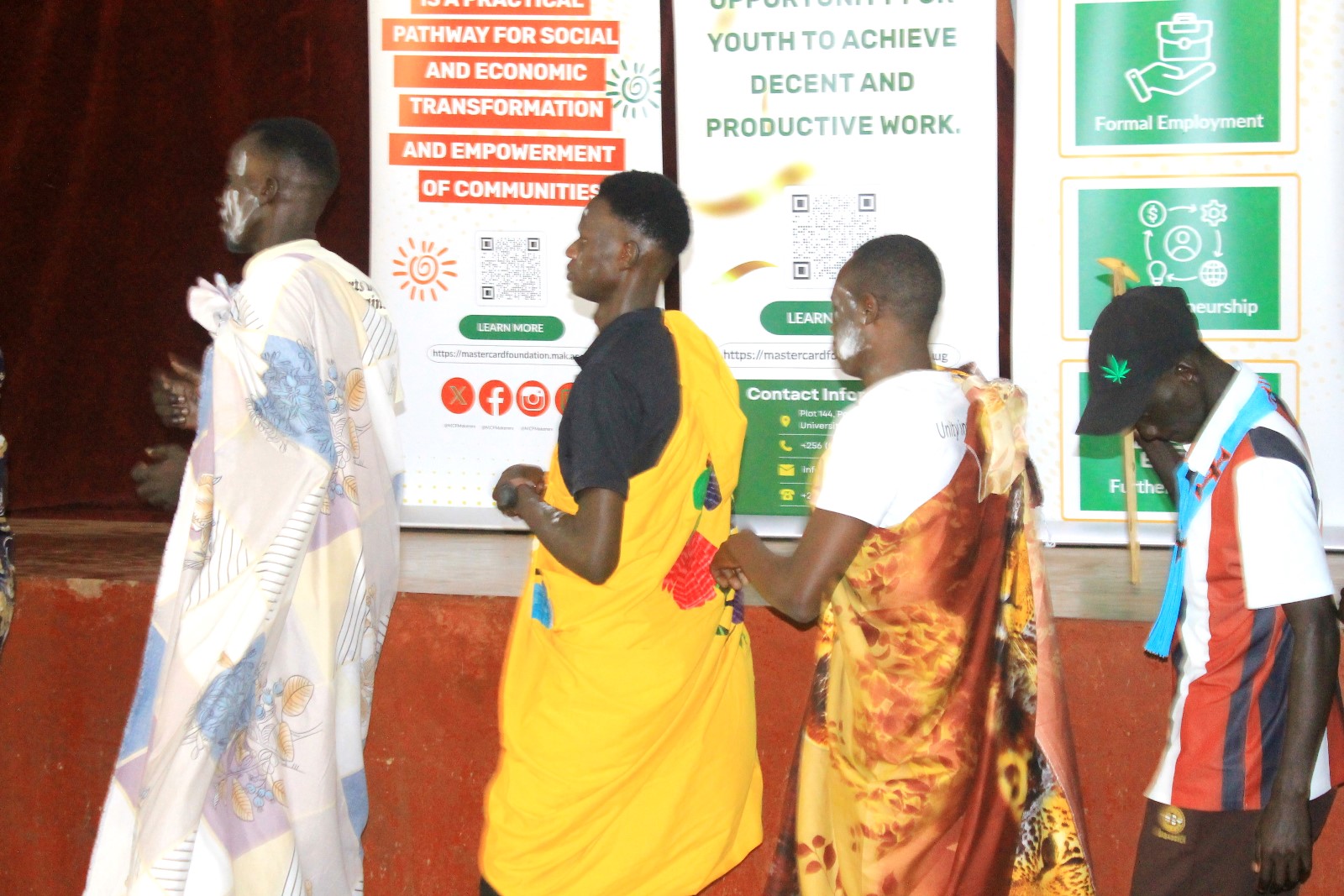
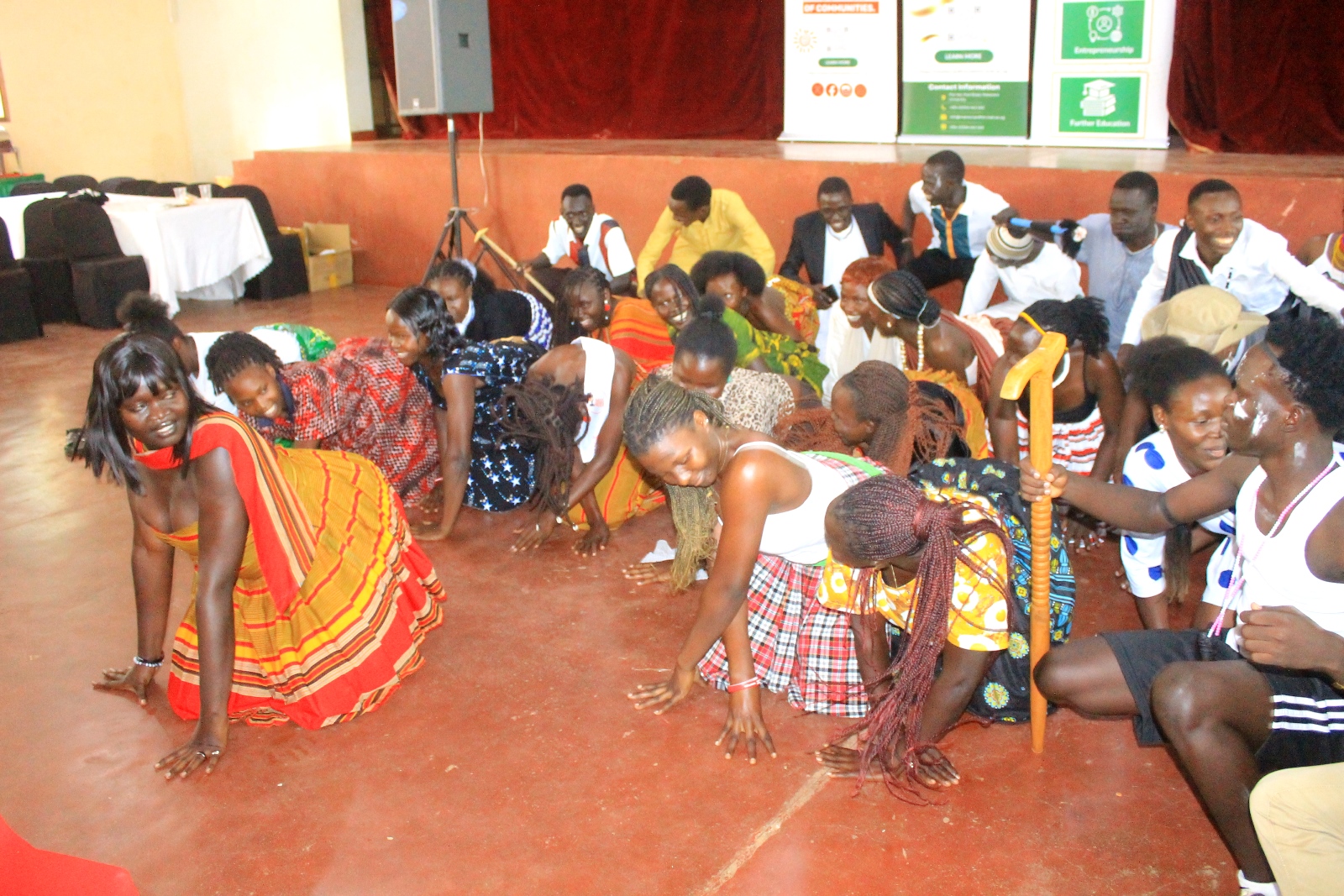
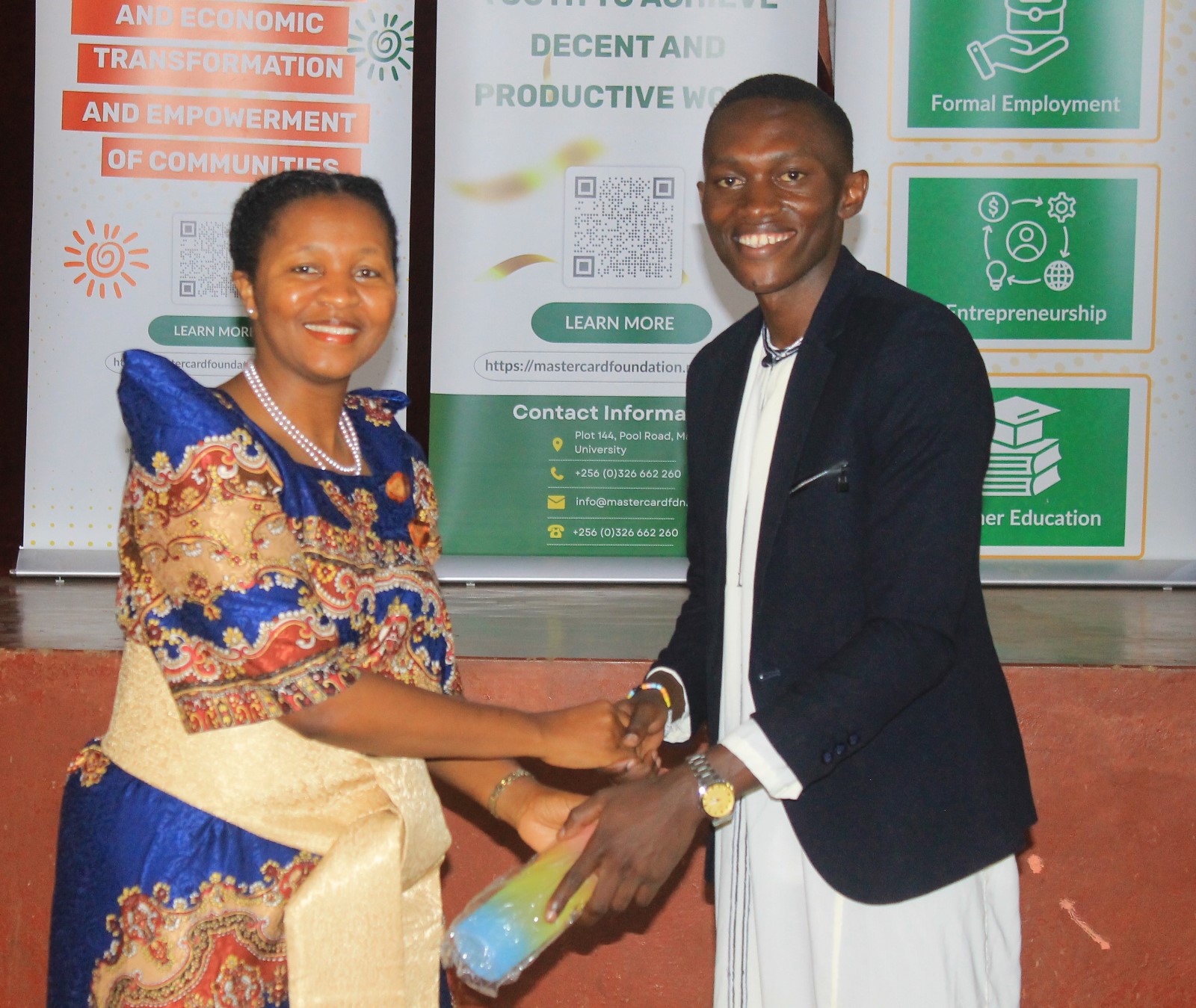
Trending
-

 General2 weeks ago
General2 weeks agoAptitude Exam (Paper 1) Results for the Mature Age Entry Scheme 2026/2027
-

 Health3 days ago
Health3 days agoUganda has until 2030 to end Open Defecation as Ntaro’s PhD Examines Kabale’s Progress
-

 Health2 weeks ago
Health2 weeks agoHow Jimmy Osuret Turned Childhood Trauma into Evidence for Safer School Crossings
-

 General2 weeks ago
General2 weeks agoFor Youth by Youth – Call for Second Cohort Applications
-

 General4 days ago
General4 days agoMastercard Foundation Scholars embrace and honour their rich cultural diversity
